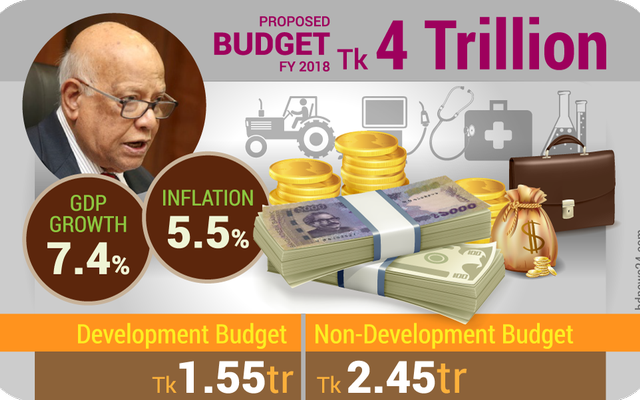Muhith lays down plan for jobs, an economist doubts

Finance Minister AMA Muhith has outlined targets and strategies for generating employment in the proposed budget for fiscal 2017-18.
He said around two million workers enter the labour market each year, of which 400,000 on average find employment abroad.
“This year, the total number of overseas employment may exceed 600,000. In the domestic market, therefore, annually 1.6 million jobs on average have to be created,” he said.
Muhith said the structure of Bangladesh’s economy is undergoing robust changes and the share of industry and service sectors in GDP is gradually rising.
"Capital-intensive technologies including mechanisation of agriculture are gaining popularity,” the minister said. “In this backdrop, we are taking special steps to generate employment opportunities for the new entrants in the job market.”
A recent survey by the Bangladesh Bureau of Statistics or BBS showed that 2.6 million people are still jobless even though 1.4 million new jobs have been created in Bangladesh since 2013.
At the same time, people have been desperately leaving the country to find jobs abroad and taking a perilous sea journey.
Dr Ashikur Rahman, a senior economist at the Policy Research Institute or PRI, said the employment data is not “reliable” in Bangladesh as it is a mathematic calculation based on the GDP growth.
“One percent GDP growth means 250,000 jobs have been created. So, 6 percent GDP growth means 1.5 million jobs have been created,” he explained.
Rahman said in Bangladesh, construction and infrastructure development getting priority means unskilled jobs are being created.
“You will not get labourers in a village for digging mud, but at the same time you will find many unemployed graduates.”
He said billions of taka are going out of the country from the jobs in managerial positions. “It is not that they are scientists or they are doing a transplant surgery here. They are working in the managerial positions.”
The finance minister said in order to meet a skills deficit at the mid and upper levels of management in the industry sector, a programme titled 'Executive Development Programme’ or EDP has been introduced.
Curricula have also been developed to produce 'world-class managers'. A nine-month diploma course will be offered under these curricula.
“Two well reputed universities from public sector and another two from private sector have been engaged under this programme.
“As a result, dependence on foreign managers will decrease on the one hand, and on the other, a pool of high-quality managers will be available to meet the demand of future industrial growth,” Muhith said.
In his speech, the minister said they had also planned “to continue providing necessary credit and input assistance in agriculture sector to prevent rise of unemployment in this sector”.
“We will take effective steps to divert the increased workforce to emerging industry and service sectors.
“By adopting labour-intensive strategies in the process of urbanisation, an adequate number of jobs will be created in the transport and construction sectors,” he said.
The government, according to him, will continue its efforts to expand the garment sector together with improving its working environment which will encourage employment of more women in this sector.
Slow adaptation to changing technology and production techniques often creates unemployment. “In this regard, we will impart necessary training to workers to improve their skills,” he said.
“We will take necessary steps to provide training and micro-credit facilities to expand opportunities for self-employment."
Employment-generating schemes for the ultra-poor under social protection programme such as KABIKHA (Money for work) and TR (Test Relief) programmes also contribute to generating more jobs, he said in the speech.
The finance minister said a considerable number of jobs will be created through various projects under development schemes of the government.
“We have already taken a number of steps to expand our labour markets abroad.
“In order to explore potential labour markets, we are encouraging private sector while promoting labour diplomacy at the government level.”
He told the parliament that Initiatives to send workers abroad at a low cost under government arrangements are going on. In order to simplify the process of overseas employment, online services will be expanded.
“We are planning to set up technical training centres at all Upazilas and modernise the existing ones,” he said.
The finance minister said they had been laying “special emphasis on developing skills of our working population as one of the key drivers of economic development”.
“In fact, there is no alternative to enhancing skills of working population for uninterrupted, rapid and sustainable development.”
The proposal to set up National Skills Development Authority under the Prime Minister’s Office recently received the cabinet’s nod.
The NSDA will take steps to enhance the overall productivity in the country through coordination among all ongoing skills development activities undertaken by the 22 ministries/divisions.
news:bd news 24.com/2-jun-2017Other Posts
- 60% increase in excise duty on bank accounts
- AL government's big election budget today
- Underperforming banks should merge
- N Korean intelligence behind BB heist: Russian expert
- State-owned banks to get Tk2,000cr to meet capital shortage
- Govt requests ADB to finance private sector enterprises Govt requests ADB to finance private sector enterprises
- Budget: Keeping money in bank to cost more
- BIDA takes stock of doing business reforms in Bangladesh
- Arastoo Khan, Chairman of Islami Bank Bangladesh Limited, presiding over a Board of Directors meeting at the bank head office in the city on Wednesday. Md Abdul Hamid Miah, Managing Director and directors of the bank among others were also present.
- Md Habibur Rahman, Managing Director of Al-Arafah Islami Bank Limited, handed over a cheque of Tk. 5 lakh for giving scholarships to poor and meritorious students to M Shahidul Islam Chowdhury, former Inspector General of Police and President of Banglades




Comments